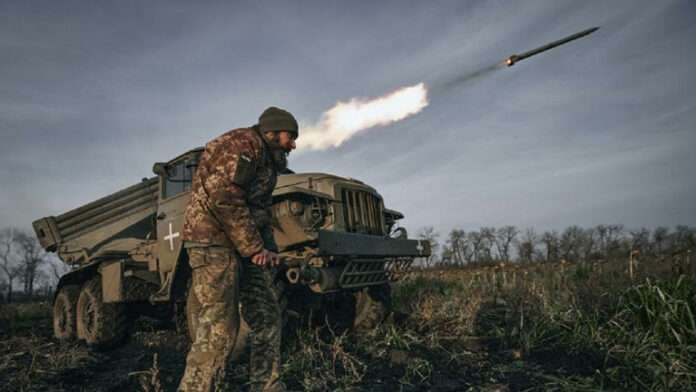Story by Ted Galen Carpenter • Yesterday 8:54 PM
At the 1-year mark of Russia’s invasion of Ukraine, expectations about the final outcome run the gamut from the belief that a definitive Ukrainian victory is imminent to warnings that Russia will ultimately prevail.
/div>
The United States and NATO are doubling down on their strategy of military assistance to Kyiv, believing that Ukraine can win the war. The recent decision to send Abrams tanks and longer-range missiles highlights the dramatic escalation.
Both the level of optimism and the extent of NATO’s aid has noticeably increased since the surprising success of Ukraine’s autumn military offensives in both northeastern and southern Ukraine that regained control of significant swaths of territory from Russian occupation forces. Former general and CIA Director David Petraeus epitomizes that attitude, saying that Russia can’t win and that there is “nothing (Putin) can do” to stop Ukraine from winning.
However, even some voices within the U.S. foreign policy establishment have expressed greater caution about Kyiv’s chances for victory in the long run. The most significant example was a January 7, 2023, op-ed by former Secretary of State Condoleezza Rice and former Secretary of Defense Robert M. Gates in the Washington Post. The title of the piece, “Time Is Not on Ukraine’s Side,” conveyed their concerns.
As I’ve argued here, the worries that Rice and Gates expressed are warranted. It is difficult to see how Ukraine can win a drawn-out war of attrition. Russia’s material advantages—a population more than 3 times greater than Ukraine’s, a much larger, better equipped, active-duty military, and a far greater ability to mobilize reserve military forces—will become more important the longer the war continues.
Because Western leaders are likely to reach that painful realization at some point, prospects will grow for another option: a ceasefire similar to the armistice that ended the Korean War in 1953 without resolving any of the underlying disputes. If Ukraine’s fortunes fade, the United States and the other leading NATO powers will have a growing incentive to press their client not to pursue a suicidal course. An armistice certainly would be preferable to a multi-year war of attrition that would inflict tens of thousands of additional casualties and destroy what is left of Ukraine’s infrastructure.
However, the Korean model created a volatile powder keg that has produced numerous alarming crises over the decades. A similar “frozen war” in Ukraine would be even more dangerous—potentially much more dangerous. In the case of Korea, the demilitarized zone (DMZ) separating the opposing armies cuts cleanly across a narrow peninsula and is only 160 miles long. A DMZ in Ukraine would involve multiple fronts and collectively would be many hundreds of miles in length.
There is another crucial difference between the 2 situations. The United States has a formal defense treaty with South Korea, and U.S. troops are stationed near the DMZ as a tripwire to deter North Korea from launching a new attack. Washington does not have any formal defense arrangements with or obligations to Kyiv. Indeed, efforts on the part of U.S. leaders to secure membership for Ukraine in NATO, or failing that, to transform Ukraine into an informal U.S./NATO military asset, was a key factor triggering Russia’s invasion. It is highly improbable that the Kremlin will agree to end the fighting, if doing so meant that U.S. or NATO forces would be stationed in Ukraine to police the cease-fire lines.
In the unlikely event that Vladimir Putin’s government did consent to such an arrangement, the result would be, by far, the world’s most dangerous frozen conflict, with NATO and Russian forces directly confronting each other.
The Biden administration’s policies have been decidedly unhelpful since the beginning of this crisis. In the months leading up to Russia’s invasion, U.S. and NATO officials spurned the Kremlin’s efforts to secure concessions guaranteeing a neutral Ukraine and the reduction of U.S. military deployments in NATO’s eastern members. Washington’s performance has not improved since the onset of fighting. Former Israeli Prime Minister Naftali Bennett believes that he was close to facilitating a peace accord just weeks into the conflict.
Contentions that the Biden administration and British Prime Minister Boris Johnson’s government “blocked” such a settlement appear to be excessive. However, there is little doubt that both governments intensely disliked the prospect of a neutral Ukraine, and they encouraged Kyiv to stay the course with promises of greater military aid.
Since then, the reckless support of Ukraine coming from Washington and London has led to spiraling bloodshed and destruction. Biden needs to drastically alter his policy. Instead of continuing to provide a blank check of support to Ukraine, he should press Volodymyr Zelensky’s government to negotiate the best peace accord that it can with Russia. Such an agreement undoubtedly would require Ukraine to renounce ambitions for NATO membership and to recognize that Crimea is now part of Russia. Moscow has indicated (during Bennett’s mediation efforts and on other occasions) that in exchange for those concessions, it would drop demands for Ukraine’s “denazification” and demilitarization. The Kremlin likely also would agree to withdraw its forces from other portions of occupied Ukraine.
The probable alternatives to such an admittedly imperfect peace agreement are a definitive Russian victory after a multi-year war of attrition or a cease-fire that would create the mother of all frozen wars, with all of the dangerous tensions that follow.
Ukraine deserves better, Russia deserves better, and the world deserves better.
Author Expertise and Experience
Ted Galen Carpenter, a senior fellow in defense and foreign policy studies at the Cato Institute and a contributing editor at 19FortyFive, is the author of 13 books and more than 1,100 articles on international affairs. His latest book is Unreliable Watchdog: The News Media and U.S. Foreign Policy (2022).





